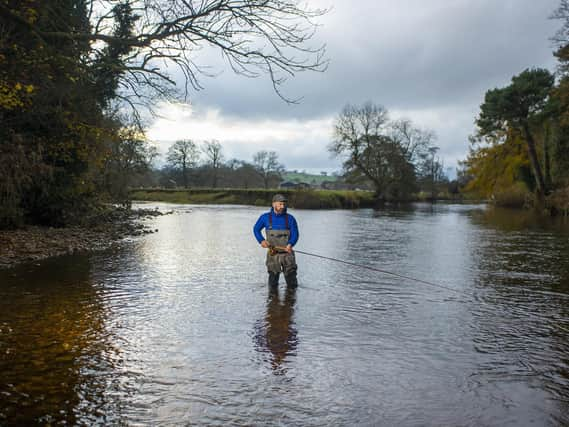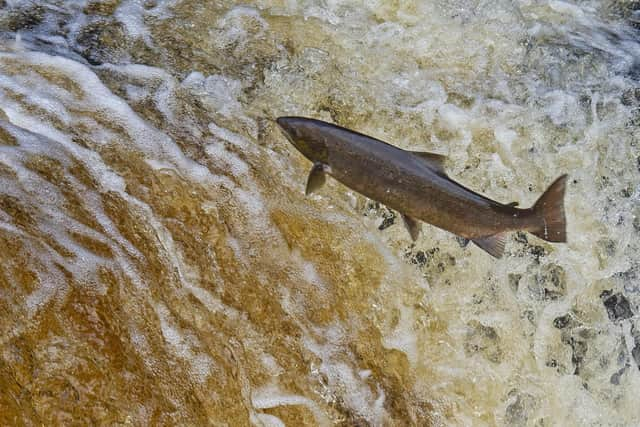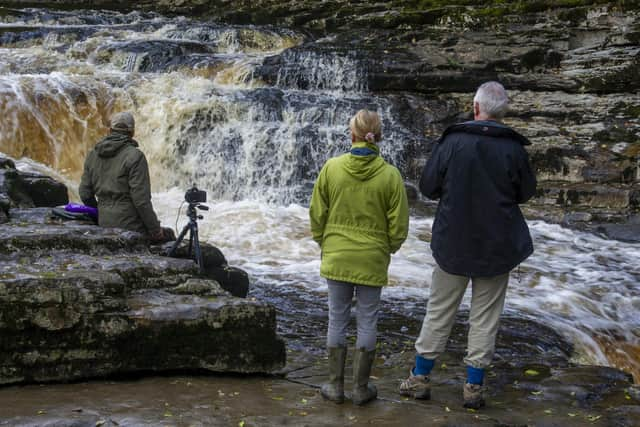How the River Ure in Wensleydale could become one of Europe's best places to see and catch salmon


Fishing guide Philip Ellis believes the River Ure in Wensleydale has the potential to become a nirvana for anglers and a leading sports tourism destination thanks to its rapidly recovering population of 'enormous' healthy salmon.
Back in the 1980s, salmon were rare in the Ure and Mr Ellis estimates that only around 100 or so fish would successfully complete the annual migration from the North Sea to the upper reaches of the river, via the Humber Estuary, each year to breed. Now, tens of thousands manage to reach their spawning grounds once again, and a hatchery programme along the Ure is replenishing the stocks further with more juvenile salmon who are free of the deadly parasitic sea lice that have plagued intensive fish farms in Scotland and Scandinavia.
Advertisement
Hide AdAdvertisement
Hide AdThe Ure's water quality has improved, and its length - 129 miles from source to sea - and rocky beds ensure a 'survival of the fittest' battle that means genetically advantaged larger fish tend to be the ones who finish the arduous journey, leading to bumper 'trophy' catches for fishermen and, increasingly, women.


Mr Ellis sees the Ure as a thriving, up-and-coming river while others, including Scotland's famous Dee, are struggling due to a combination of natural and environmental factors - and he has been busy building relationships with landowners along the riverbank, wader-friendly Richmond MP Rishi Sunak, and prestigious hotels such as Swinton Park and The Blue Lion at East Witton to develop the salmon tourism offer in the Dales.
"I've fished since childhood, and have been all over the country chasing salmon - Scotland, Cumbria. In 2010, I volunteered with the Ure Salmon Trust after the Environment Agency did a survey of juvenile numbers. I've helped with habitat restoration and the hatchery, worked with the river manager, and got to know the whole river. I've built up relationships with landowners. As a guide, I now know exactly where the salmon all are, and I have access to private land.
"Since lockdown, there has been more of a focus on homegrown tourism and I really want to promote the Ure. It's improving every year - it's more than just a little section of one little river. It is cleaner, wildlife is thriving, and each salmon caught is worth around £2,000 to the local economy in terms of spend in hotels and restaurants."
Advertisement
Hide AdAdvertisement
Hide AdSalmon are notoriously evasive and difficult to catch, and so reeling one in becomes a life goal and the Holy Grail of angling for many of their pursuers.


"You just don't catch one every year. For a lot of people, they are the pinnacle of a fishing career. They're totally wild fish and you can go years without catching one. I believe I can increase someone's chances ten-fold, and it's my knowledge people are paying for."
Mr Ellis, who lives in Northallerton, has benefitted from the support of his local MP, Mr Sunak - who enthusiastically donned a pair of waders to enter the Ure and has been 'heavily involved' in opening up the river, though he has yet to land a salmon.
He is also working with local fim-maker Callum Curtis, of Hutton Rudby, who focuses on field sports, in the hope of securing funding via a Kickstarter campaign to produce a documentary of a year in the life of the Ure.
Advertisement
Hide AdAdvertisement
Hide Ad"Salmon fishing is accessible to all, it's not just a posh hobby. My clients have ranged from binmen to millionaires. It's a great leveller and a common interest - it brings people together and you will get them all chatting away on the bank. More women are taking part now - my partner hooked one within 10 minutes of getting in the river for the first time!
"It's proven to improve mental health. After a day in the river you feel so relaxed and refreshed. It's not just the fishing, it's seeing otters and kingfishers, hearing the water trickling and the birds singing. It's therapy."
Although the numbers of both fish and anglers are still a way off Scotland's Dee Valley - a region which generates £20million a year from the industry - Mr Ellis trusts that quality rather than quantity could see the Ure quietly overtake other destinations in future.
"In places like Iceland and Norway, salmon are more prolific, but here there is a steady increase every year. In the Swale too, there used to be no salmon at all, but now you can see 30 or 40 at a time trying to get up Topcliffe Weir. In Scotland, there are lots of small salmon, but here they are enormous. It's a trophy river where you can catch a 15kg (30lbs) fish. It's a big river system and because of that, the fish have to be bigger to go the distance and spawn; you get more genetic variation.
Advertisement
Hide AdAdvertisement
Hide Ad"Many other rivers are in decline because of predation from seals and seabirds. The fish farms in Scotland have issues with sea lice, a parasite that kills the juveniles, and it's becoming an issue in Canada and the States too. There are no fish farms along the Ure, so the juveniles have a good chance of making it out to sea and the survival rates are good. I'd say 90 per cent of rivers are either stable or struggling - but ours is an improving success story."
The Ure salmon season runs from April until October. To donate to Mr Ellis's Kickstarter project to make a film about the 2021 season, click here.
Comment Guidelines
National World encourages reader discussion on our stories. User feedback, insights and back-and-forth exchanges add a rich layer of context to reporting. Please review our Community Guidelines before commenting.